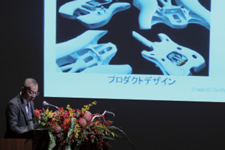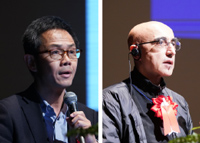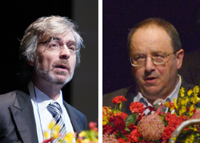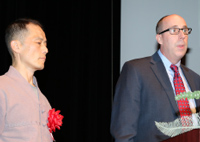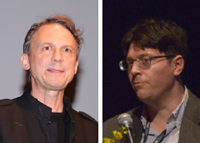| Day2 11/15 Thu. | The 19th UC-win/Road Conference |
New World Brought About by 3D Expression Technologies in Cooperation, Expanding Potential
| Day2 of the Design Festival (Nov. 15, 2018) was opened up by opening remarks
of Yuji Ito, Representative Corporate Executive Officer, FORUM8 Co., Ltd.
followed by the special lecture by Masanao Sasabuchi, CEO, Shade3D Co.,
Ltd., entitled "VR contents market and future Shade3D". First of all, he enumerated VR-related element technologies as trend keywords, such as VR, AR, MR, S3D, 3DPM, BIM, CIM, 3D print. Then he looked back on the flow: 1) 1970's symbolized by ASCII ART, which was the origin of CG, 2) 1980's of static images while realizing realistic representation, when performance of PC improved and the radiosity method was developed, 3) 1990's when path tracing and photon mapping were developed and the age of still images was shifted to that of animation, 4) 2000's when the range of use of CG spread from video production to 3D CAD and action games, with contents getting higher in quality, and 5) 2010's when compounding of element technologies represented by UC-win/Road advanced, demands for huge amount of 3D contents resulted, and optimization of contents such as BIM and CIM was aspired. |
|

| The 4th State of the Art Technologies in Expression Association / Latest Technology Art Sessions | Day2 | |||
Special Lecture by Mr. Akira Hasegawa, New Chairman of the Art Technologies in Expression Association / Announcement of the 2nd Hagura Award
|
The 4th State of the Art Technologies in Expression Association / Latest
Technology Art Sessions started with a special lecture by Mr. Akira Hasegawa,
who is a digital artist and assumed a chairman of the association in August
2018. "We can say the earth is a huge brain, assuming networks as
neurons and users as synapses", he commented and introduced a lot
of his "Digital-Kakejiku" projects. Following the special lecture,
the 2nd Hagura Award was announced, and the award-giving ceremony was held.
The Hagura Award / FORUM8 Award / Encounraging Award (5 works) were decided
this year. The Hagura Award was given to "Bowl de Planetarium"
co-created by Faculty of Art and Design, University of Toyama and Toyama
Science Museum. By shooting a drawing painted on semi-sphere cambus inside
a bowl with fish-eye lens and projecting the image on the planetarium dome,
even children can create a whole-sky image easily. This work will make
planetariums more familiar art device to people who use it. Mr. Hasegawa
highly evaluated this work because "It can be en event product for
everyone."
"AR disaster simulation app Disaster Scope" created by Department of Technology, Aichi University of Technology won the newly established FORUM8 Award. This development overlays CG image of water immersion and smoke on the real scenery by using smartphone and paper goggles. This gives wearers an accurate image of disaster risk and a sense of danger. Mr. Hasegawa commented, "This work has a huge sociality. I hope it would be available at schools around Japan so that students can improve their sense of disaster prevention." Encouraging Award were given to the following 5 organizations: Remote motion eye line real-time whole-sky stereoscopic view system "TwinCam Go" (Faculty of Systems Design, Tokyo Metropolitan University); the real-time image merging technology "Get together at 9" (Tokyo University of the Arts); "Monster world at night" (Mizuki Shigeru Road night view design team) that simulates lightings along Mizuki Shigeru Road at night; a large display contents with high luminance and high definition "Experience wall" (TOPPAN PRINTING CO., LTD); "Design method of minute structure for display of several images" (DWANGO Co., Ltd.'s) that can be realized with general 3D printers and UV printers. After the award ceremony, the association's activities were explained. Mr. Hiroo Kasagi (representative of NPO Chiikizukuri Kobo) reported the result of "Expression Technology Test (Construction ICT)" held on October 26, 2018 and announced the overview of the 2nd "Expression Technology Test (City construction)" planned to be held in April 2019.
|
| Day2 |
Report of Unique Projects Seeking the Advanced Utilization of UC-win/Road
At the International VR Symposium, researchers from various fields in universities all over the world present research results of the workshop held every summer. Lead by Prof. Yoshihiro Kobayashi from Arizona State University, this project marked the 11th anniversary, and many unique research developments seeking advanced utilization of UC-win/Road are going on. The workshop 2018 was held at Victoria University of Wellington (New Zealand) where one of the workshop member Prof. Schnabel belongs.
The first presentation at the symposium was "UC-win/Road Advanced User Experience" made by Prof. Ruth Ron (Shenkar College of Engineering, Design and Art) and Prof. Amar Bennadji. They added camera models such as static camera, drone, and onvehicle camera to achieve output of entire perimeter. They cited an addition of voice tutorial at the time of clicking icon as a point to be improved. In addition, they commented that playing tutorial on a small screen while creating continued projects on the main screen, and changing languages are also available.
 |
|
 |
||||
Next, Prof. Tomohiro Fukuda (Osaka University) and Prof. Marcos Novac (California University) made a presentation of their research on "Framework for general purpose image processing simulation". As they increased the number of segmentation in object that they showed the previous year, different depictions are displayed according to moving speed of human and vehicle, acceleration, terrain, distance, and time. In addition, they improved the real-time shader function based on model, speed, and height.
 |
|
 |
||||
Prof. Kostas Terzidis (College of Design and Innovation, Tongji University) and Prof. Paolo Fiamma (University of Pisa) made a presentation named "New vision of BIM and parking lot". They said that they will aim at realizing the linkage by using IFC between UC-win/Road and BIM software that have a simulation function and applying it to international projects. They also mentioned that parking spaces for campers that is now an issue in Europe will be a new suggestion for the utilization of parking lots and that the VR review from user's eyes is possible by using UC-win/Road.
 |
|
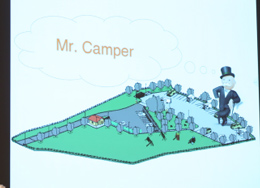 |
||||
Next presentation "Development of system to manage excavation work and to strage electronic archaeologic material" was made by Prof. Thomas Tucker and Prof. Dongsoo Choi (Virginia Polytechnic Institute and State University). They commented UC-win/Road helps efficient management of processing during the excavation work for heritage investigation such as photo servey by drone and point cloud modeling if users save the processings with it. The system is planned to be corresponded to GPS location data.
 |
|
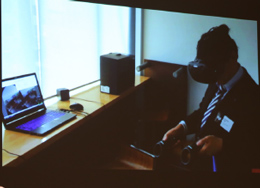 |
||||
Prof. Matthew Swarts (Georgia Institute of Technology) and Prof. Marc Aurel Schnabel (Victoria University of Wellington) made a presentation on "Development of VR interactive type entertainment device". They presented an education system using a traffic kit by magnetic train system as an interactive system that connects physical and virtual. This system enables to change speed and path of each train, and they are planning to add lighting etc. and sell it as an education kit.
 |
|
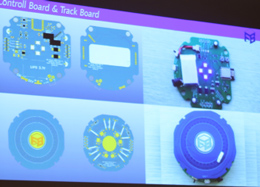 |
||||
The final presentation was made by Prof. Yoshihiro Kobayashi (Arizona State Univeristy) and Prof. Taro Narahara (New Jersey Institute of Technology). Their research "Frame work for education of machine learning and machine control technology" is a review on a system construction that allows learners to learn application of machine learning as well as to experience AI. As it can export image data with UC-win/Road log data, users can transmit data after learning to a robot via Raspberry Pi. This allows users to drive on different courses based on learning result and to test on different models and software.
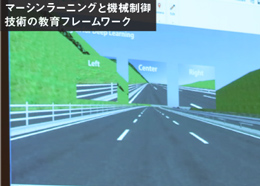 |
|
 |
||||
After the presentations, Pencreach Yoann, VR Development Manager of FORUM8 commented about the achievements made in this symposium. "I am interested to mount many of the presented systems to real products. In particular, we are already planning to build the electronic storage system for VR excavation survey created by Prof. Thomas and Prof. Dongsoo in the gannt chart of 4D simulation", he summerized.
 |
 |
|
| Award ceremony of Academic Encouragement Award held at the party after all the sessions were over. |
||

|
The 6th Student Cloud Programming World Cup Open presentation & Award Ceremony |
Day2 |
A lot of useful and professional works were presented.
Participants of the 6th CPWC competed their programming skills by using development kits of UC-win/Road and VR-Cloud®. At the beginning of the final judgment, Assoc. Prof. Tomohiro Fukuda (Chairman of the judging committee, Graduate school of Osaka University) talked about the meaning of this competition in the transition that programming is being mandatory at elementary school by 2020. In presentations by each nominated team, juries provided their opinions to each work submitted to this high-level competition: "Many teams created sophisticated works combining multiple things such as autonomous driving and AI"; "More works contains professional contents for example the cooperation with sensors."
"Autonomous Truck Loader using OpenCV" created by Tech.Dives (University of Engineering and Technology, Taxila Pakistan) won the Grand Prix. This program consisted of 2 modules and communicates with UC-win/Road via UDP protocol. A front camera equipped on track detects objects and lanes, and message is displayed every time the vehicle lifts trash or snow. Assoc. Prof. Fukuda, the chairman of the judging committee commented that he highly evaluated the challenging work that realized snow removing and trash collecting by using deep learning.
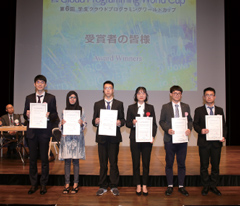 |
 |
 |
| Award winners | Grand Prix team | Open presentation (University of Engineering and Technology, Taxila Pakistan) |
|
The 8th Student BIM & VR Design Contest on Cloud Open presentation & Award Ceremony |
Day2 |
World Cup Award was given to a team from Taiwan again this year where produces many high-level teams.
The theme of The 8th VDWC was "Sharable urban system of future Shanghai". Prof. Yasushi Ikeda (Graduate School of Keio University / Representative of IKDS), who is the chief of executive committee mentioned that 43 teams entried this year and the competition is becoming more internationally and exciting year by year as it is named World Cup. In the presentations, the juries judged how each team expressed their own future city by focusing on human activities. "Create the sharable system of both space and facilities to promote the interpersonal interaction and regional vitality Catalyst" (National Cheng Kung University, Taiwan) took into consideration that main needs in the region are mainly from office workers, and most activities are now held inside the skyscrapers. Focusing on four parts including work, life, commuting, and rest, they created a sharable system for both space and facility in order to realize a new urban vision that promotes the interpersonal interaction and regional vitality while improving the efficiency of resource use. "This work had the outstanding idea of sharing by bridges connecting high buildings", said Prof. Ikeda.
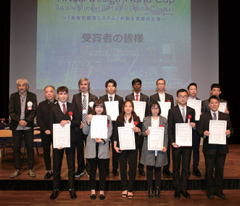 |
 |
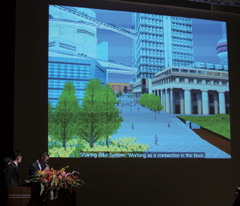 |
| Award winners | Grand Prix team | Open presentation (National Cheng Kung University) |

| Day2 Junior Software Seminar | |
Mr. Pakkun & Mr. Yuji Abe were amazed by children's imagination
| FORUM8 holds "Junior Software Seminar" for elementary and junior high school students in every long vacation in winter, spring, and summer. Works created by participants in a year are awarded in Design Festival every year. The atmosphere of the stage this year was very lively since Mr. Patrick Harlan aka Pakkun, who is a MC of a TV program "Innovative Tomorrow The future of that industry changed by VR!", participated as a commentator following to VDWC and CPWC in addition to the familiar reporter Mr. Yuji Abe. Six works were awarded to Gold Prize, four to Silver Prize, and eight to Bronze Prize. | 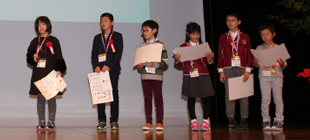 |
||
|
 |

